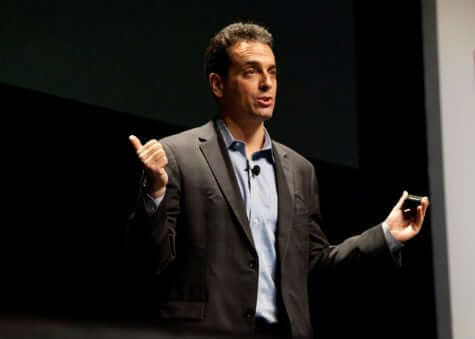Selling is hard, but this was worse. I didn’t just have to sell, I had to sell to the guy who literally wrote the book on selling.
My target was Daniel Pink, a five-time bestselling author and thought leader on the changing world of work. His latest, To Sell is Human: The Surprising Truth About Moving Others, gives a definitive look at modern sales and sits atop The New York Times business bestseller list.
I wanted Dan to invest in my company, iDoneThis. But it was a tall order — I had to persuade the guy who had seen, studied, and written about every trick in the book.
Sales in a four-person startup and the modern world of selling
I’m no salesman. I’m an introvert and a bit of a nerd. I grew up doing math and programming for fun, and eventually I went to law school and was trained as a lawyer. I’d barely sold anything in my life. When I started iDoneThis, we didn’t have a sales department, and the job of fundraising and sales (and janitor and everything else) fell into the lap of the company founders.
I didn’t know it, but it turns out that my little startup is part of a massive trend that’s taken hold of even much larger companies: projects are run by small, cross-functional teams without any specialized sales department. We’re all selling now, and this is a point that Dan drives home in his book To Sell is Human.
Business software company Atlassian is a 600+ employee company that has organized this way to great success, making over $100 million in annual revenue without a single sales person.
You see, at your typical enterprise business software vendor, the relationship begins between vendor and customer with a visit from the vendor to the potential customer, prospecting for new business. At Atlassian, the customer relationship with begins when the customer learns about Atlassian, visits their website, and is immediately able to sign up and begin trying out the software for herself.
From there, the customer might have questions or reach out for support while they’re directly experiencing and using the product. Atlassian’s support team is there to answer questions, and their engineers are there to fix bugs — what they don’t have is a sales team that badgers you to commit. What that means for Atlassian then is that sales “isn’t anyone’s job. It’s everyone’s job.”
Building a long-term relationship through the product
We first connected with Dan two years ago, but the funny thing is that we didn’t even know it at the time. Amazingly, in September 2011 — just like how people learn about and become customers at Atlassian — Dan signed up for iDoneThis, tried it, and loved it.
Over the course of the next two years, we got to know Dan better, and his support was the stuff of young startups’ dreams. He blogged about us, talked about us at conferences, and recommended us to his loyal following. We got on the phone a few times to talk about the research he’d done on motivation to better understand how to help fellow iDoneThis members get more done. We made sure to check in with him at regular intervals to share our progress.
The upshot is that when I got on the call with Dan to talk with him about fundraising, we already had a relationship that was built up through interaction around our product.
The pitch
Even though we had history, I was ridiculously nervous right before the investment conversation. I thought I’d quelled the nerves and got on the call, but I ended up giving him a horrible pitch. When we were done, I hung up feeling pretty crushed because I was sure I’d blown an incredible opportunity to get Dan on board.
Then something awesome happened — Dan started following up with questions. And I was so happy to help answer them.
It turns out Dan wanted to take a deeper dive into the terms of the convertible note, because he had never angel invested before. We got our lawyer to jump on the phone and answer any and all questions he had.
Then, I didn’t hear from Dan for a few weeks. Finally, he emailed me. He was in. Dan wrote, “I figure a product I’ve used every day for 2 years has something going for it!”
I don’t think I’m the only one to fall into the trap of thinking that sales simply means selling. Yet we’ve been so fortunate at iDoneThis to have investors and supporters like Dan who found value and service in our product as customers and fans before they came to fund our company.
My experience with those supporters and Dan finally drove home the point that I’d been trying to learn in theory from companies like Atlassian. When sales is everyone’s job, it’s the inversion of what most of us think of as the sales process. Instead of sell, then serve, it’s serve, then sell — and that’s a powerful thing.
Walter Chen is the founder and CEO of iDoneThis, the easiest way to share and celebrate what you get done at work, every day. He blogs about management, entrepreneurship, and happiness on the iDoneThis Blog. You should follow him on Twitter at @smalter.
